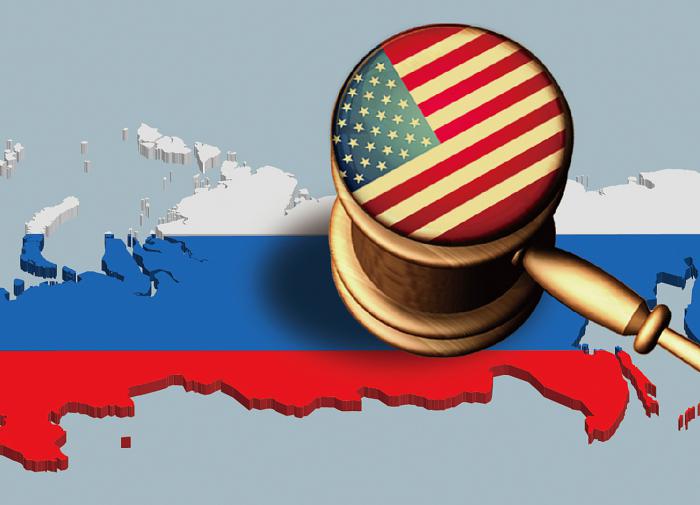Biden creates nothing but storm in a tea cup trying to punish Russia
The United States has imposed new sanctions on Russia in connection with the attempted assassination of opposition leader Alexei Navalny, US Secretary of State Anthony Blinken said on Twitter.

According to the spokesman for the Joe Biden administration, the US intelligence community came to conclusion that the Federal Security Bureau of Russia (FSB) used the Novichok nerve agent against Navalny in August.
"We are neither seeking to reset our relations with Russia nor are we seeking to escalate," White House official spokeswoman Jen Psaki said.
The new sanctions are directed against officials of the security bloc, several research institutes and chemical industry enterprises (which allegedly created and supplied chemicals for Novichok poison), research institutes of the Defense Ministry (most of them are under sanctions already), the FSB and the GRU. At the same time, the US side allowed US companies to cooperate with the FSB of Russia as a regulator in the field of import of cryptographic equipment.
The US Department of Commerce imposed sanctions on pharmaceutical industry enterprises, including foreign ones. Now these companies will not be able to legally import US products.
In a nutshell, the Biden administration has reproduced the sanctions that the Trump administration imposed on Russia for the alleged poisoning of the Skripals.
The new restrictions include denial in providing US public aid to Russia (with the exception of humanitarian aid) and arms supplies to Moscow, even though Russia does not receive either the public aid or weapons from the United States. To crown it all, the US government agencies have been prohibited from giving loans to the Russian state.
Biden lifted the exemption from Trump's sanctions that allowed exports of goods and technology to Russia for commercial space launches. However, an exemption will apply to US exports aimed at intergovernmental cooperation in space exploration. Exports related to ensuring the safety of passenger aviation will not be affected either.
Any sanctions issued by any US administration stipulate that the United States may use any exceptions dictated by national security considerations.
Russian rubles rises in value
It just so happens that there is not a single systemically significant sanction:
- one can still buy the Russian debt;
- there is not a word about disconnecting Russia from SWIFT;
- there are no sanctions against Russian state-run banks and the oil industry.
The Russian ruble strengthened its position a bit against the background of this news.
In an interview with gzeromedia.com, Eurasia Group President Jan Bremer said that the US sanctions will hardly affect the US-Russian relations.
"This is the same approach to sanctions that we saw in the European Union. They do not target the sectoral level. They do not target large state-owned companies either. They target several Russian officials who participated in the Russian chemical program. The Russians are annoyed, but they are not going to retaliate," said Bremer.
Vasily Koltashov, the head of the Center for Political Economic Research of the Institute of New Society, told Pravda.Ru that this package of sanctions turned out to be practically painless.
"These sanctions are not crucial. They are simply new ritual actions from the American administration. They once again confirm that, firstly, there is no free market and, secondly, that the United States is not at all committed to the principles of unrestricted trade and advocates political interference in economic relations," said the economist.
The expert believes that the United States "is afraid to impose real painful sanctions, because it has so many vulnerable places." These are positions primarily of such companies as
- Microsoft,
- Boeing,
- Apple
"all virtual resources and everything related to intellectual property and the sphere of intangible production," he said.
"One can deprive them of their benefits and money-making opportunities very quickly. For example, Russia's commitment to Microsoft products can be stopped, which will be very painful for Microsoft. To prevent this from happening, the US should wage the war of sanctions fiercely, albeit with the help of insignificant tools. Too many emotions and little real action," the expert told Pravda.Ru.
Russia's response to Biden's sanctions
Russian Foreign Ministry spokeswoman Maria Zakharova told VestiFM that USA's attempts to impose something on Russia through sanctions or other means of pressure are doomed to failure. Zakharova called on the White House "not to play with fire", but to conduct an equal dialogue with the Kremlin on a reasonable basis.
"As for our response, we will definitely respond. Nobody has canceled one of the rules of diplomacy - reciprocity," Russian Foreign Minister Sergei Lavrov told reporters.
According to Lavrov, foreign partners refuse to cooperate with Russia honestly as far as the Navalny case is concerned. Instead, they prefer to nibble around the edges and punish Moscow. "This does not honor anyone who makes such decisions," the minister said.
According to Vasily Koltashov, Russia could troll the US in its retaliation.
"US sanctions ban US government structures from giving loans to the Russian state. In response, the Russian administration should also prohibit Russian government structures from lending to the American government (maybe the Central Bank should be prohibited from doing this, although it has been doing this out of habit for long). By and large, such counter-sanctions cannot have any significance," Vasily Koltashov told Pravda.Ru.
Subscribe to Pravda.Ru Telegram channel, Facebook, RSS!


